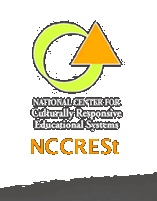
---

---

---

---

---

|
 |
 |
NCCRESt
part of the Education Reform Networks
You are in:
Subject —>
Indigenous Populations
-
"I've Really Learned a Lot, But...": Cross-cultural Understanding and Teacher Education in a Racist Society
Describes a cross-cultural course offered by the Faculty of Education at the University of Regina (Saskatchewan, Canada) to develop preservice teachers' understanding of aboriginal cultures, taking data from instructors' experiences and student narratives. The paper discusses the lack of understanding in white preservice teachers' views of self and others and the implications for teacher education in a racist society.
-
Angela: A Pedagogical Story and Conversation
Presents a fictional account of one teacher's experience with an Aboriginal student, focusing on the details in each section of the story to highlight the many preconceived notions teachers may have when dealing with Aboriginal students. A sidebar offers guidelines for establishing a safe environment for discussing and learning about culturally sensitive issues.
-
Bilingual Education Policy and Practice in the Andes: Ideological Paradox and Intercultural Possibility
Discusses bilingual education policy and reform in the context of indigenous languages of Peru, Ecuador, and Bolivia, exploring the ideological paradox inherent in transforming a standardizing education into a diversifying one and in constructing a multilingual, multicultural national identity. Data come from policy documents and practitioner narratives.
-
Breaking the Cultural Cycle: Reframing Pedagogy and Literacy in a Community Context as Intervention Measures for Aboriginal Alienation
This paper presents an alternative view to the pedagogical needs relating to literacy for Aboriginal students. The question posed is how to utilize this knowledge to lessen the impact of perceived failure in early schooling of entrenched non-attendance patterns for Aboriginal students of compulsory school attending ages.
-
Ceremonial Access
Explores the use of elements of the cultural practices of native peoples in the elementary school classroom as a way of introducing children to other cultures. Discusses the appropriate use of native-like experiences in contextualized mimesis to bring life to curricula.
-
Community College Humanities Review, 1999
This special issue of the Community College Humanities Review contains articles generated by National Endowment for the Humanities Summer Institutes, held over several years. The institutes provided opportunities for academics from a variety of humanities disciplines and types of institutions to interact over an extended period of common study of topics associated with the encounters of European and indigenous cultures in the New World.
-
Community College Humanities Review, 1999
This special issue of the Community College Humanities Review contains articles generated by National Endowment for the Humanities Summer Institutes, held over several years.
-
Escaping Education: Living as Learning within Grassroots Cultures. Counterpoints: Studies in the Postmodern Theory of Education, Vol. 36
This book challenges the modern certainty that education is a universal good and a human right and celebrates the well-being still enjoyed in the commons and cultures of people living at the grassroots. The first section describes how education is an instrument of acculturation.
-
First Nations Studies: The Malaspina Success
The articles in this issue of Learning Quarterly, published by the Centre for Curriculum, Transfer and Technology (British Columbia), discuss First Nations Studies (indigenous populations), a partnership between Malaspina University-College and First Nations of Vancouver Island and coastal British Columbia.
-
First Nations Studies: The Malaspina Success
The articles in this issue of Learning Quarterly, published by the Centre for Curriculum, Transfer and Technology (British Columbia), discuss First Nations Studies (indigenous populations), a partnership between Malaspina University-College and First Nations of Vancouver Island and coastal British Columbia.
-
Indigenous Education: Survival for Our Children
Article explores definitions of indigenous peoples and the meaning of indigenous education. Education has often been a political tool to deny the identities of indigenous people, but it can become a way for indigenous people to reclaim their rights and cultural identities.
-
Indigenous Peoples, Globalization, and Education: Making Connections
Globalization pushes aside social, cultural, and ethical goals of education in favor of marketplace goals. Two stories of the indigenous Ju/'hoansi tribe in Botswana illustrate how even well-intentioned multicultural education programs can marginalize indigenous people, and how "globalization from below," fueled by communities of sentiment, can redirect globalization toward advancing social justice in a sustainable future.
-
Integrating Western and Aboriginal Sciences: Cross-Cultural Science Teaching
Addresses issues of social power and privilege experienced by Aboriginal students in science classrooms. Presents a rationale for a cross-cultural science education dedicated to all students making personal meaning out of their science classes.
-
Multiliteracies and Life Transitions: Language, Literacy and Numeracy Issues in Aboriginal Health Worker Training--An Investigation
The issues of language, literacy, and numeracy (LL&N) in Aboriginal health worker (AHW) training in Australia were explored to determine how these issues interrelate, overlap, and influence the types of literacy practices required in indigenous contexts. Data were collected through two workshops and formal and informal discussions with a sample of nine AHW trainers from four organizations.
-
Native American Perspectives
On the Fajada Butte in New Mexico, 11th-century Anasazi constructed a site that marks the high and low points of the orbits of the sun and the moon. This unit on astronomy challenges students to think differently about the moon and about the ability of native people to understand the natural world.
-
Reflecting Visions. New Perspectives on Adult Education for Indigenous Peoples
This book contains 14 papers on Adult Education, Adult Learning, Educational Needs, Educational Strategies, Indigenous Populations,and
Popular Education.
-
Representations of Indigenous Knowledges in Secondary School Science Textbooks in Australia and Canada
Employs discourse analysis techniques to examine the approach taken in addressing minority group knowledges in two recently-published sets of junior secondary science texts, with a specific focus on the incorporation of indigenous knowledge into the texts. (Contains 44 references.) (Author/WRM).
-
South Africa: A Place for English Teaching Pioneers
Discusses the importance of English-as-a-Second-Language (ESL) education in the multicultural country of South Africa, where for the majority of residents, English is the second language. Examines the variety of languages of South Africa, the language-education crisis in South Africa, and the country's need for language teachers.
-
Taken to Extremes: Education in the Far North
This book examines the history of education of indigenous peoples in circumpolar countries of the Western world and contemporary issues in schooling there. It offers perspectives on school and society in villages spread across the Arctic and Subarctic regions of Alaska, Canada, Greenland, Norway, Sweden, and Finland.
-
The "Strangers" among Us. The Social Construction of Identity in Adult Education. Linkoping Studies in Education and Psychology No. 61
A study examined the labeling practices in the multicultural discourse in two adult education settings in Sweden: a day folk high school and a municipal adult education center. A total of 33 students and 9 staff members from two adult education programs were interviewed.
-
Video-conferencing for Collaborative Educational Inquiry
Profiles a series of video conferences that examined the effects of European settlement on the art of Aboriginal peoples in Australia and the cultural conflicts facing contemporary Aboriginal artists. The video conferences brought together Aboriginal artists and Canadian educators.
-
Working with Aboriginal Women: Applying Feminist Therapy in a Multicultural Counselling Context
Argues that counselor education for working with Aboriginal women must address both culture and gender issues, and that this may be done by applying feminist theory within a multicultural counseling perspective. Explores these perspectives, their application to these women, and specific counselor education considerations.
|
edreform.net
| | edreform.net
 |
|





